| |
|

Tuesday, May 27-Thursday, May 29 Lipinsky Family S.D. Jewish Arts Festival
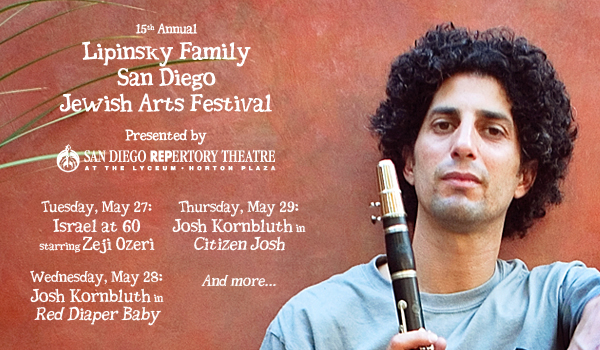
Wednesday, May 28 JFS~Ellen Saks lecture on mental illness
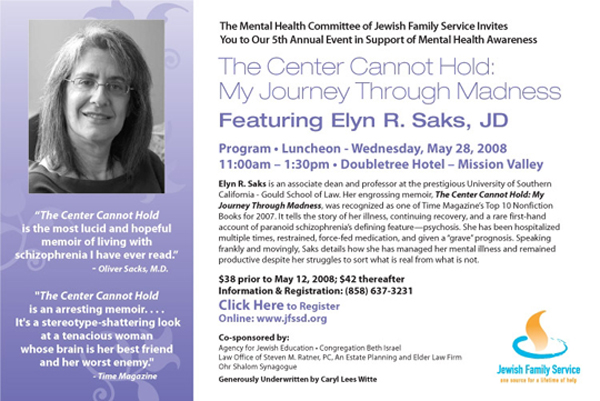

Tuesday, June 3 Guardians Golf & Tennis Tournament


Thursday, June 5 Tifereth Israel's 'Girls Night Out'


Friday-Saturday, June 6-7 JFS~Judaism on the Wild Side


Sunday, June 8 Temple Solel~Tikkun Leil Shavuot


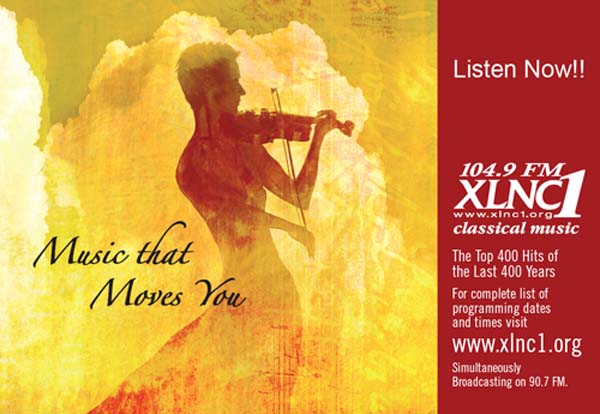

A Jew contemplates his new right to marry
By Brian Schaefer
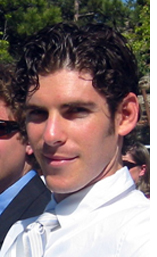 SAN DIEGO—I came out to my parents on the eve of Passover. Looking back, it was a rather symbolic shedding of my personal chains and a bold transition from the slavery of self-doubt to the freedom of self-embrace. The process was nothing short of a blessing - it has reinforced our bonds as a family and my parents' unconditional support and love has been my pillar of strength. Whether they would agree with me or not, I think its fair to credit Judaism for their acceptance (and also, celebration) of my identity. SAN DIEGO—I came out to my parents on the eve of Passover. Looking back, it was a rather symbolic shedding of my personal chains and a bold transition from the slavery of self-doubt to the freedom of self-embrace. The process was nothing short of a blessing - it has reinforced our bonds as a family and my parents' unconditional support and love has been my pillar of strength. Whether they would agree with me or not, I think its fair to credit Judaism for their acceptance (and also, celebration) of my identity.
My parents have always kept a Kosher household and, as a result, I keep Kosher to this day as well. They, as I do, respect the teachings and traditions of the Torah and understand that adherence to these principles is a good recipe for a fulfilling, productive, and socially conscious life. Yet they situate these teachings within our contemporary society and acknowledge that ancient teachings cannot always adequately respond to a constantly evolving world. Which doesn't mean you ditch the teachings, it means you struggle with them, and delve deeper to seek a clearer meaning, and figure out how your reality and your experience fits into our traditions and our faith.
I recognize that your opinion about same-sex marriage will be directly related to the type of Judaism you practice. To those who hold the bible to be the word of G-d, who deny the role of women in the clergy, and who refuse to accept the integration of gay and lesbian rabbinical students into our seminaries, then I suspect same-sex marriage has no place in your traditions and to that I say: Well, at least you're consistent.
 But those of us for whom Judaism plays an important and meaningful part of our lives yet don't make it to shul on a weekly basis, for those of us whom finding a Jewish mate is still the Holy Grail (bad analogy) but still date inter-religiously in the meantime, and for those of us whom Judaic law and the Torah still hold some serious weight, but who aren't afraid to flip a switch on Shabbat - in other words, modern American Jews… I think Judaism provides ample room to support same-sex marriage. But those of us for whom Judaism plays an important and meaningful part of our lives yet don't make it to shul on a weekly basis, for those of us whom finding a Jewish mate is still the Holy Grail (bad analogy) but still date inter-religiously in the meantime, and for those of us whom Judaic law and the Torah still hold some serious weight, but who aren't afraid to flip a switch on Shabbat - in other words, modern American Jews… I think Judaism provides ample room to support same-sex marriage.
I'd say my parents are such Jews. And what I think my parents discovered is that my sexual orientation does not conflict with the fundamental tenets of Judaism or that even if it did (even if you can't get past those few lines of biblical text that supposedly condemn my relationship while you simultaneously ignore passages on stoning unruly children), even then you could see that Judaism holds no relationship more sacred than that of a family, that no emotion is more celebrated than that of love between two people (which indeed includes same-gender mutual affection in the Torah), that nothing as silly as social taboos and political ideology should ever drive a wedge between parents and their child.
I don't know if my parents made their way through this thought process together or separately, or whether it took them a few days or a few years or if they're not even there yet. But not once did it occur to them that I was any less their son. And with that decision, how could they deny that my love for my partner is any less valid than that of my brother for his girlfriend? And if you go that far, how can you possibly argue that therefore my brother has any more of a right to marry than I do?
Ah, but there is tradition. The tradition that marriage is between a man and a woman, because it says so in the Bible, because it has been so for centuries. And when you force marriage between same-sex couples, you change the definition of marriage, right?
Well, no. I would argue that all we're changing here is the access to marriage, not the definition of it. The definition remains the same: a life-long commitment of two consenting adult citizens of a state that bestows upon them a whole bunch of federal rights and responsibilities, regardless of their intent to raise children. I would also argue that the religious definition of marriage has been far more prominent in this national debate than we ought to be comfortable with.
To those who resist this expansion of the institution of marriage to include same-sex partners, I might suggest instead that all couples, same-sex or opposite-sex, should be granted civil unions under the Federal government and that the distinction of the term "marriage" be reserved for religious institutions who are then free to bestow the symbolic and spiritual honor to whatever combination of two humans as they see fit.
That way, your religious teachings, whatever they are, do not have to determine whether I can visit my partner in the hospital when he is sick or, G-d forbid, dying.
In regard to the recent ruling of the California Supreme Court, we as modern, practicing, faithful Jews should indeed be celebrating the decision, which is not the result of activist judges, as some claim, but rather an example of our honored checks and balances at work. Because our nation values equality of access and opportunity above all else. Because our courts and our constitution were designed to protect the rights of the minority from the mere opinions and biases of the majority. And this is something that our Jewish community, that makes up approximately1.5% of the American population, should find much comfort in.
Besides, Judaism needs the lesbian and gay community. In a century where the number one crisis to American Jewry is intermarriage, what sense does it make to further cut out a dedicated and loyal population who is basically desperate to raise Jewish kids and join your synagogues and contribute to your Federation and support your foundations – if only you would acknowledge us and validate our experience and welcome our families.
So the fact that my partner is not Jewish – that you can have issue with. But the fact that he's a guy? That doesn't really affect you, nor does it devalue our religion or threaten the stability of your family. You know the real threats to marriage? Try Britney Spears, who's spontaneous nuptials in Las Vegas followed by an immediate annulment are the ultimate slap in the face to this institution. Or how about Elizabeth Taylor, who along with her seven husbands, is the actual Grim Reaper of modern marriage.
But me? No, I'm just a nice, Jewish boy who has suddenly been given the right to a future that can now include a legally recognized family, one that I intend to raise with the beauty and complexity of our Jewish heritage.
Besides, my mother really wants some grandchildren. You wouldn't deny her that, now would you?

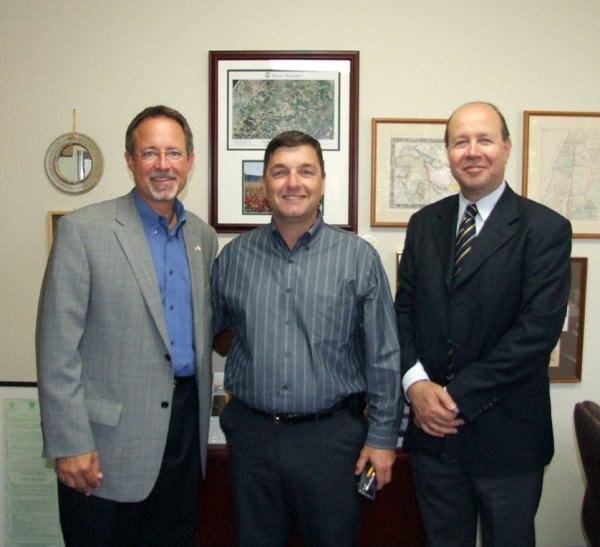
THE JEWISH CITIZEN
Jewish Agency for Israel, UJF weigh Ibim Student Village partnership's direction
By Donald H. Harrison
 SAN DIEGO—Moshe Vigdor, director general of the Jewish Agency for Israel, stopped in San Diego on Tuesday to discuss with the lay leaders and staff of the United Jewish Federation the future direction of JAFI's partnership with San Diego in the running of the Ibim Student Village in the Sha'ar Hanegev region of Israel. SAN DIEGO—Moshe Vigdor, director general of the Jewish Agency for Israel, stopped in San Diego on Tuesday to discuss with the lay leaders and staff of the United Jewish Federation the future direction of JAFI's partnership with San Diego in the running of the Ibim Student Village in the Sha'ar Hanegev region of Israel.
The-ten year contract entered into by San Diego in 1998 to contribute $750,000 per year for the running of the Ibim program has nearly expired. While the UJF is expected to continue the relationship, how much money it will annually contribute to the village and what new programs will be offered there were among the subjects of a private two-hour meeting that Vigdor conducted with the lay leaders and staff.
Following that meeting, Vigdor told San Diego Jewish World that he laid out a number of program options for the San Diegans to consider, and also requested that they consider increasing this area's annnual contribution for the village.
He explained that because of inflation $750,000 today buys only what $500,000 would have purchased ten years ago. "We shared this with them and we know they will give whatever they can, and if they decide to leave the $750,000 we will be happy, but if they decide to give more, we will be happier, no doubt," Vigdor said.
Built to accommodate 400 student immigrants in a variety of programs, the Ibim Student Village is located in an area that has been hit frequently by Kassam rockets fired by terrorists in Gaza.
"I remember some years ago when the first Kassam hit the fence of Ibim, I went to visit the students, to encourage them and to tell them they have to be strong," Vigdor said. "They were not frightened at all; they were encouraging me. But no one expected at that time that this (Kassam rockets) would become a daily issue. It is unbelievable."
The director general of the Jewish Agency said that "Ibim village was selected as one of the major places in the region to have fortifications done by the government. What we did was as follows: we raised money for the dining room; we brought in a big shelter, which stands on the ground so that if you walk away and suddenly there is an alarm (signalling an incoming rocket), immediately you get into the shelter. We put in about four of this kind."
Apartment buildings in the student village, located close to the city of Sderot, also have been equipped with safe rooms "in a very careful manner, so as not to destroy the harmony of the village," he said.
The students who come for 12-month or 10-month programs to learn Hebrew and engineering typically are from the former Soviet Union, Ethiopia, or countries of Latin America, particularly Argentina.
Vigdor said he proposed to the United Jewish Federation various programs that could increase the number of interactions among established Israelis and the immigrant students, whose parents often have remained behind in their country of origin. He stressed that these were only proposals, and that what programs will be embarked upon and which will remain on the drawing board is subject to the will of the United Jewish Federation.
One proposal concerned the creation of what Israelis call an "urban kibbutz" at the Ibim Student Village. This would involve having between 20 and 30 Israeli students living together at the village, while going to school either at Sapir College in Sderot or at Ben Gurion University of the Negev in Beersheva.
"The idea is to interact, to have special programs, joint programs, for the Israeli students to support the immigrants in the afternoons while they are preparing their homework, and to welcome them," Vigdor said.
"When we talk about students from the former Soviet Union, that is one issue; when we speak about the Ethiopians, who are coming from absolutely another civilization, they are very shy; they are not open at all," JACI's top official said. "It is very important that we open them, that they feel part of the community. So if you have a group that will be engaged with them, that will speak with them, that will support them if they have difficulties in their studies, that will make a major difference."
Another proposal Vigdor presented was for Young Leadership Development. He suggested that students from Sha'ar Hanegev and San Diego might be encouraged to spend a year together working and studying at Ibim. "Those students could come to research Jewish identity, and, again, they could interact with those who are coming from the other countries," Vigdor said. "So that is also a program we would like to explore."
Michael Rassler, chief executive officer of the United Jewish Federation, said that the Ibim Task Force Study Committee, with which Vigdor met, will weigh his proposals and then make recommendations to the UJF's board of directors. While no exact time table has been scheduled, both parties are mindful that JAFI would like to make an announcement in mid-November at the General Assembly of the Jewish Agency for Israel about the future directons of Ibim. The 10-year-contract runs out at the end of the year.
Among those task force members who were present to meet with Vigdor were Kevin Wechter, the task force chair; UJF President Kenneth D. Pollin, past UJF presidents Dr. Steve Solomon and Gary Jacobs; incoming UJF President Andrea Oster, and task force members Theresa Dupuis and Claire Ellman. There were also various senior UJF staff members present as well as JAFI staff members.
Vigdor said that while Ibim Student Village is important in the absorption process of immigrant students, it is also important to the welfare of the Sha'ar Hanegev region. This is because it creates a steady infusion of potential settlers in the population-starved Negev. Developing the Negev in the southen portion of the country "is of top importance" to Israel, many of whose citizens are now concentrated in the Tel Aviv and Jerusalem metropolitan areas.
With Sha'ar Hanegev under constant rocket attack, Vigdor said, the fortified Ibim Student Village sends an encouraging message to Sha'ar Hanegev residents that Israel is "developing the Negev, not leaving the Negev and not stepping aside even under that type of attack."


ARTS IN REVIEW
Busy Salovey launches 15th Annual Lipinsky Family San Diego Jewish Arts Festival
By Carol Davis
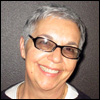 SAN DIEGO—Todd Salovey is a busy man. I caught him on the run before he headed off to teaching an acting class. At the same time, he is in the midst of the opening of the 15th Annual Lipinsky Family San Diego Jewish Arts Festival,which will be taking place at the San Diego Repertory Theatre where he is the assistant artistic director as well as at The Old Globe and at the North Coast Repertory Theater in Solana Beach, where he is teaming up with artistic director David Ellenstein. SAN DIEGO—Todd Salovey is a busy man. I caught him on the run before he headed off to teaching an acting class. At the same time, he is in the midst of the opening of the 15th Annual Lipinsky Family San Diego Jewish Arts Festival,which will be taking place at the San Diego Repertory Theatre where he is the assistant artistic director as well as at The Old Globe and at the North Coast Repertory Theater in Solana Beach, where he is teaming up with artistic director David Ellenstein.
He told me the Festival started 15 years ago when a gentleman named Phil Tauber who was on the board of the Center for Jewish Culture and Creativity in L.A. made a connection in San Diego. Taking the center's roster of artists with him and presenting it as a full-day festival in San Diego, it grew from a one-day celebration to a weeklong series of festivities to what it is today, “a celebration of the beauty and diversity of Jewish culture through theatre, music, dance and visual arts."
Now the Festival serves both the north, central and the metropolitan areas of San Diego County stretching out for a month long season with activities, including the New Plays series, which takes place at NCR. The rest of the Festival is at the downtown Lyceum Theatre with the exception of three plays by Hershey Felder at The Old Globe Theatre in Balboa Park.
For the past six years now Ellenstein and Salovey have partnered. Both pick out a play; Ellenstein directs and/or acts in it and Salovey directs only. I asked him why he doesn’t act and he told me he does best at directing with a deferential laugh. He also mentioned that Ellenstein manages to put at least one Jewish-themed play into his season at NCR. With so many of Jewish patrons moving to the north, there is a great audience for those plays.
This past season Shayna Maidel, which I found to be a moving experience, was mounted. In the past he has presented The Chosen, by Chaim Potok, that was critically acclaimed and his Donald Margulies’ Sight Unseen which Ellenstein won critical acclaim for his direction.. This coming season NCR has as one of its offerings Margulies’ Shipwrecked, which I saw at the South Coast Repertory Theatre in its world premiere, which was reviewed on sdjewishworld in 2007. So they both bring beautiful Jewish art to our community.
This year The 8th Annual Klezmer Summit, which Salovey says is the most popular event in the entire festival, will take place on Monday, June 30 at 7:30 p.m. Both Hot P’Stromi starring Yale Strom and Una Noche Yiddische (a South American influenced on Jewish music experience with Argentine clarinest Gustavo Bulgach and his band Klezmer Juice) will make up a diverse klezmer double header.
Why spread out the Festival? Why north county and downtown? These were questions I posed to Salovey and the most concise reply was that there is an audience to support the festival both in north and central San Diego and while not everyone will attend every show, there is enough variety to go around for anyone who wants the diversity to see and enjoy.
For a complete list of events on the Festival please go to www.sandiegorep.com or call (619) 544-1000.
See you at the theatre this time for Nosh and fun!

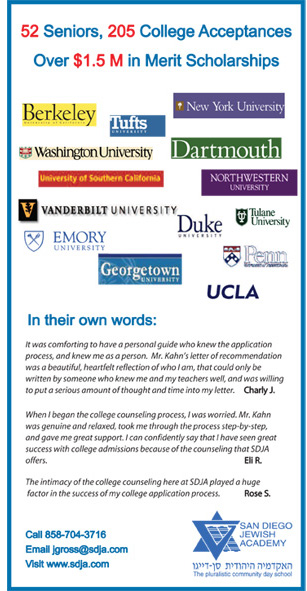


San Diego County Jewish Trivia Football
Adapted from San Diego Trivia (1989) and San Diego Trivia 2 (1993)
{Editor’s Note: Retired librarian Evelyn Kooperman, a friend to the Jewish community, enjoys playing the cello and collecting trivia about her native city of San Diego. This column excerpts Jewish communal items from her two books, San Diego Trivia (1989) and San Diego Trivia 2 (1993). Readers should note that the information has not been updated since the books were published. Kooperman still has a limited supply of the two books, which cover the general San Diego community in all its aspects. Either of the two volumes sells for $5 and may be obtained by telephoning the author at (619) 461-6095.}
By Evelyn Kooperman
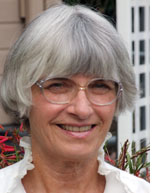 SAN DIEGO—Q1: What former Charger coach is in the Pro Football Hall of Fame? SAN DIEGO—Q1: What former Charger coach is in the Pro Football Hall of Fame?
Hint: After playing football at Ohio State, he coached college team for 20 years. He then switched to the pros, where he was the Los Angeles Rams' coach from 1955 to 1959. In 1960 he changed to the Los Angeles Chargers, and when they moved to Sa Diego in 1961, he came with them. He brought them to five division titles (counting 1960 in Los Angeles), and to the AFL championship in 1963. He later coached the Houston Oilers, and became the first coach to win division titles in both the AFL and NFL.
Q2 What San Diego Charger was the second AFL player elected to the Pro Football Hall of Fame?
Hint: When he was a number one draft pick in 1960 in both the NFL and the new AFL, he chose the AFL's Chargers. During his ten years with the Chargers, from 1960 to 1969, he played in seven AFL All-Star games and fve AFL title games. He is still considered one of the best offensive linemen of all time, and was named to the AFL-NFL 1960-84 All-Star Team, all Time Pro Team, and Jewish Sports Hall of Fame. Between seasons, he received his Doctorate of Jurisprudence from USD and completed law school there in 1970. He is now a practicing attorney in San Diego.
Please click here for answers

ADVENTURES IN SAN DIEGO JEWISH HISTORY
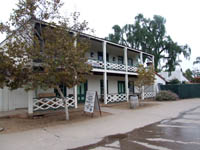
Robinson-Rose House
|
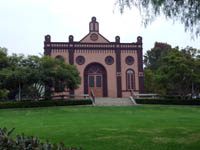
Old Temple Beth Israel |
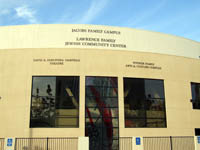
Lawrence Family JCC |
Editor's Note: We are reprinting news articles that appeared in back issues of various San Diego Jewish newspapers. You may access an index of the headlines of those articles by clicking here. You may also use the Google search program on our home page or on the headline index page to search for keywords or names.
Pearl Zagor to Appear on S.O.S. Program
From Southwestern Jewish Press, April 18, 1946, page 10
By Julia Kaufman
Pearl Zagor, who has for some time been a favorite with SAn Diego audiences, will present a dramatic interpretation of one of the seasons most popular plays. She will appear at the Temple Center, 3rd and Laurel, on the evening of May 8th, 8 p.m., for the S.O.S. Collection now being carried on throughout this city.
Admission for this performance will be a minimum of five articles, either canned foodstuffs such as coffee, milke, vegetable soups, cocoa, rice, etc., etc., or the equivalent in comfort items and medicines sch as absorbent cotton, medicines, brushes, vaseline, razor blades, etc.
This is not a fund raising campaign. The S.O.S. Collection represents aid to victims of Nazi persecution over and above any financial participation in the United Jewish Fund.
The War is not over, the liberation of our overseas neighbors is not complete until our people are no longer congealing from cold, no longer weak from hunger--until they are able to stand on their feet and face the world. Their lives depend on us.
The following organizations are sponsoring this program: Beth Jacob Center, Ladies Auxiliary Beth Jacob, B'nai B'rith Lasker Lodge, Council of Jewish Women, Birdie Stodel B'nai B'rith, Congregation Tifereth Israel, Hadassah, Jewish Community Social Club, Jewish Consumptive Relief Association, Temple Beth Israel Sisterhood, Jolly Sixteen, Junior Charity League, Pioneer Women of Palestine, Yo-Ma-Co Club, Old Peoples Home, and War Veterans Auxiliary. The Temple Beth Israel is donating the use of the Temple Center for the evening. The United Jewish Fund is defraying the costs of shipments to New York.
Mrs. H. Rubel, who is chairman of this affair, will take care of the refreshments following Pearl Zagor's performance.
Bring along as many of your friends and neighbors as possible. We have a goal of 20,000 pounds to meet and with a continuation of the present united effort, we should exceed this goal.
Welcome Home...A Job Well Done
From Southwestern Jewish Press, April 18, 1946, page 10
Stanley Seigel, son of Rabbi and Mrs. Ephriam Seigel, was discharged from the Army last Friday April 12 at Fort Bliss, Texas, and is now at home in San Diego.
Staff Sgt. Seigel entered active duty a day after Passover 3 years ago, serving in the field artillery of the 69th, 29th, and then the 78th division in the European Theatre and spent the last four months with the occupation troops in Berlin.
Seigel plans to reenter San Diego State College in the fall to resume his studies.
T5 Isadore B. Seigel is home on furlough from Camp Beals, California, to see his brother and spend the Passover Holidays with his family.
Camp Services
From Southwestern Jewish Press, April 18, 1946, page 11
During this week, the USO-Jewish Welfare Board staff visited both Camp Pendleton and Camp Elliott and attended services with Chaplain Samuel Sobel at both these stations. Refreshments were served and discussion hour held after the services.
Our hospital committee visited the Santa Marguerita camp hospital, and Camp Pendleton, and the Balboa Naval Hospital, bringing gifts and refreshments to all the Jewish patients. Mrs. Mollie Ratner is chairman of this committee, and is assisted by Mrs. Sarah Giller. Mrs. Giller has served faithfully for the past year, visiting the Naval Hospital each week and bringing comfort and solace to the men she meets.
San Diego Jewish Trivia answers: 1) Sid Gillman 2) Ron Mix
{Return to top}

Nancy Harrison
cruise & tour specialist
(619) 265-0808

SAN DIEGO JEWISH WORLD THE WEEK IN REVIEW
Ulla Hadar in Kibbutz Ruhama, Israel: A baby owl gladdens Kibbutz Kfar Aza
Donald H. Harrison in San Diego: Rev. John Hagee and the American Jewish problem with Christian fundamentalists
Sheila Orysiek in San Diego: 'Another' finds and civilizes lonely man
Adventures in San Diego Jewish History: What was the Jewish community news in 1939 or 1940? Who were the newsmakers? Our archives answer these questions in daily installments
Shoshana Bryen in Washington, D.C: Syria-Israel peace discussions strain their respective alliances with Iran, United States
Ulla Hadar in Kibbutz Ruhama, Israel: SDJA students visit Poland and Israel
Sheila Orysiek in San Diego: Loving photography in the service of dance
Adventures in San Diego Jewish History: What was the Jewish community news in 1939 or 1940? Who were the newsmakers? Our archives answer these questions in daily installments
Ulla Hadar in Kibbutz Ruhama, Israel: Blammmm! A Kassam in my back garden?
Donald H. Harrison in San Diego: JACC theme: 'Keeping Israel on the map'
Rabbi Baruch Lederman in San Diego: Slain Torah scholar started as dishwasher
Rabbi Leonard Rosenthal in San Diego: 'Sanctified shekel' hints at money's purpose
Isaac Yetiv in La Jolla, California: 'If the shoe fits' ... Obama and appeasement
Adventures in San Diego Jewish History: What was the Jewish community news in 1922 or 1939? Who were the newsmakers? Our archives answer these questions in daily installments
Carol Davis in Ottawa, Canada: A Jewish rendezvous in Canada
Ulla Hadar in Kibbutz Ruhama, Israel: Israeli mayors neighboring Gaza demand Israel's goverment stop the terrorist rockets
Sheila Orysiek in San Diego: Chapter Nine in the serialization of her novel, Reluctant Martyr
Ira Sharkansky in Jerusalem: Are peace talks Olmert's diversion?
Howard Wayne in San Diego: Farewell to two dear friends: Lionel Van Deerlin and Mike Gotch
Adventures in San Diego Jewish History: What was the Jewish community news in 1950? Who were the newsmakers? Our archives answer these questions in daily installments
Donald H. Harrison in San Diego: Reelect San Diego Mayor Jerry Sanders
Eran Lerman in Jerusalem: 'Peres' Planet': Electric cars, Arab-Israeli cooperation, new cities in the Arava
Hal Wingard in San Diego: His songs "Adira Hee," "Lech L'cha," and "Mitzvah Soup"
Adventures in San Diego Jewish History: What was the Jewish community news in 1950? Who were the newsmakers? Our archives answer these questions in daily installments
Link to previous editions
< BACK TO TOP
|
|
